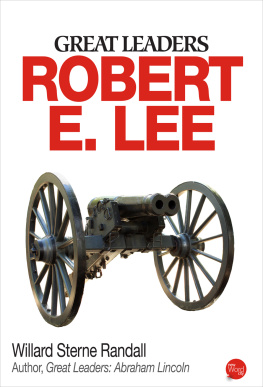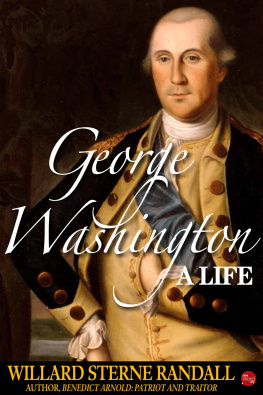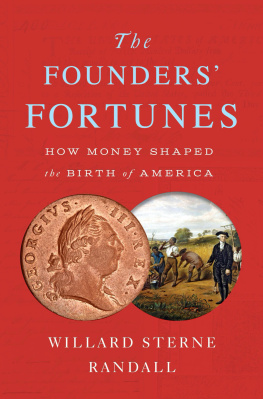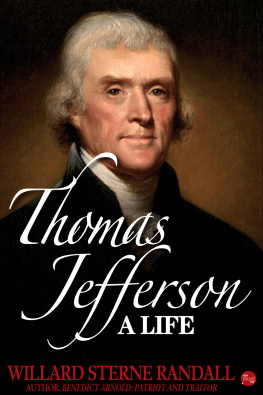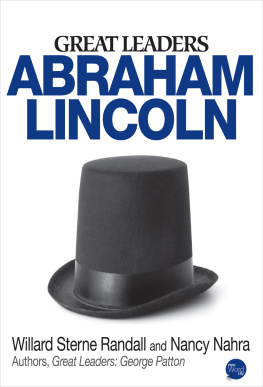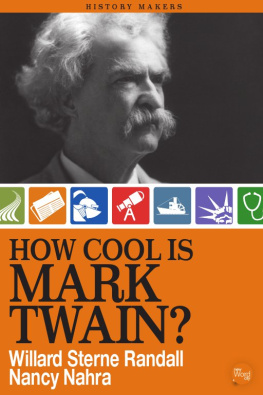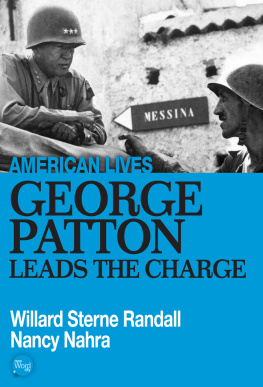Willard Sterne Randall - Robert E. Lee
Here you can read online Willard Sterne Randall - Robert E. Lee full text of the book (entire story) in english for free. Download pdf and epub, get meaning, cover and reviews about this ebook. year: 2013, publisher: New Word City, genre: Non-fiction. Description of the work, (preface) as well as reviews are available. Best literature library LitArk.com created for fans of good reading and offers a wide selection of genres:
Romance novel
Science fiction
Adventure
Detective
Science
History
Home and family
Prose
Art
Politics
Computer
Non-fiction
Religion
Business
Children
Humor
Choose a favorite category and find really read worthwhile books. Enjoy immersion in the world of imagination, feel the emotions of the characters or learn something new for yourself, make an fascinating discovery.
- Book:Robert E. Lee
- Author:
- Publisher:New Word City
- Genre:
- Year:2013
- Rating:5 / 5
- Favourites:Add to favourites
- Your mark:
- 100
- 1
- 2
- 3
- 4
- 5
Robert E. Lee: summary, description and annotation
We offer to read an annotation, description, summary or preface (depends on what the author of the book "Robert E. Lee" wrote himself). If you haven't found the necessary information about the book — write in the comments, we will try to find it.
Robert E. Lee took up arms to defend the Souths system of slave plantations. Yet he considered the ownership of slaves such an abomination that he freed his own. After the Civil War, his name became synonymous with duty, honor, and courage. Here, in this short-form book, is his story along with lessons for every aspiring leader.
Willard Sterne Randall: author's other books
Who wrote Robert E. Lee? Find out the surname, the name of the author of the book and a list of all author's works by series.
Robert E. Lee — read online for free the complete book (whole text) full work
Below is the text of the book, divided by pages. System saving the place of the last page read, allows you to conveniently read the book "Robert E. Lee" online for free, without having to search again every time where you left off. Put a bookmark, and you can go to the page where you finished reading at any time.
Font size:
Interval:
Bookmark:
Robert E. Lee was unquestionably the greatest Confederate general of the Civil War and arguably the greatest hero of the antebellum South. A son of two of Americas most prominent families, the Lees and Carters of Virginia, his lineage may have been both a boon and a curse. He gained even more prominence by marrying into the family of George and Martha Washington.
Lees fame stems both from his military achievements and his spectacular failures. Widely respected then and now for his courage, grace, and selflessness, the general fought not for personal glory but as a loyal son of Virginia. So admired was he in defeat that the victorious Union Army commander General Ulysses S. Grant was moved to write, There was not a man in the Confederacy whose influence with the whole people was as great as his.
On the eve of the Civil War, the man who took up arms to defend the Souths system of slave plantations had already freed the half-dozen slaves bequeathed to him, along with a much larger group belonging to his wife, the step-granddaughter of George Washington. Taking ownership of ones fellow human beings, no matter their race, struck Lee as nothing less than an abomination. Because his personal views conflicted with those of his compatriots, Lees name became synonymous with duty and honor when he followed his home state and accepted the command of the Confederate Army of Northern Virginia.
Dressed in his impeccable gray uniform, Lee symbolized Southern resistance to the Union juggernaut and also to the economic upheavals brought on by the Industrial Revolution. Northern men outnumbered Confederate freemen of fighting age nine to one. Nevertheless, Lee unflinchingly faced the tide as it destroyed his beloved and genteel way of life.
Few in the South or North, during the war or for generations after, knew just how much Lee silently suffered throughout his life as the poor member of an aristocratic family. As a boy, he dreamed of becoming a doctor, not a soldier. He attended the U.S. Military Academy at West Point because it was free and the only way he could go to college after his feckless father lost the family fortune.
Robert Edward Lee was born on January 19, 1807, in a baronial brick mansion near Montross, Virginia, not far from Washingtons birthplace. Stratford Hall, the family home, had been erected by Queen Caroline of England out of gratitude for the Lee family after their original house burned down. Though the Lees royalist English roots dated back to the Norman Conquest, two of Roberts relatives signed the Declaration of Independence. His father Henry earned recognition during the American Revolution, leading Lees Legion on daring cavalry raids and scouting missions. But Light-Horse Harry, as he was called, speculated unsuccessfully in Western lands. By the time Robert was two years old, his father was languishing in debtors prison. Neither his fame as a Revolutionary War hero nor his political success - he served as governor of Virginia from 1792 to 1795 - could cancel the consequences of his reckless investing.
By the time Robert turned four, his mother, Ann Carter Lee, the daughter of another wealthy Virginia family, had moved herself and her five children to a small, rented house in Alexandria, Virginia. She struggled to subsist on a modest legacy and augmented it by the sale of family heirlooms.
Henry, out of debtors prison, was offered a new command as head of Virginias militia when the War of 1812 broke out. But in this second war of American independence from England, Henry, a staunch Federalist, opposed Americas unilateral declaration of war. The narrow nineteen-to-seventeen vote for war in the Senate was the closest in any U.S. conflict. The Federalists believed the issues - the search of American ships and impressment of sailors to reinforce the crews of Royal Navy ships in their war against Napoleon - could be resolved by diplomacy.
In July, General Lee rode to Baltimore to support Federalist printer Alexander Hanson, an old friend who outspokenly opposed the war in his Federal Republican newspaper. Many people in Baltimore, refugees from a failed Irish rebellion, considered anyone opposed to the war an enemy, a Tory traitor siding with the British.
When a crowd of mostly pro-war Irish sailors and shipyard workers sacked Hansons newspaper office, destroying his printing press, he and his Federalist friends barricaded themselves in the three-story brick building. Lee thought he knew how to handle a mob. So when hundreds of boys and men stoned the building, smashing its windows and shutters, he fired his pistols in the air. But others fired into the crowd, killing one attacker and wounding several others. The next morning, the crowd returned with a cannon and shelled the house. Local officials jailed the Federalists for their own safety, but then stood by helplessly as the mob broke in. Lee and his companions were dragged outside and severely beaten. Brought home more dead than alive, the fifty-four-year-old Light-Horse Harry never fully recovered. He turned down Virginias commission as a major general and sailed to Barbados in the British West Indies. Out of reach of political opponents and creditors, he effectively abandoned his family. Robert was five when he last saw his father.
Growing up practically in the shadow of Mount Vernon, Lee made frequent visits to wealthy relatives while his mother lectured on frugality, duty, honor, and loyalty. Somehow, her admonitions only made young Robert miss his self-exiled father all the more. Even as others accused Light-Horse Harry of disgracing his family, the boy loved and admired his father and waited eagerly for his occasional letters, filled with sage paternal advice: Self-command is the pivot upon which the character, fame, and independence of mortals hang, the elder Lee wrote. Fame in arms or art, however conspicuous, is naught unless bottomed on virtue. To his wife, Henry wrote, Robert, who was always good, will be confirmed in his happy turn of mind by his ever-watchful and affectionate mother. Light-Horse Harry died far from home when Robert was eleven.
Moving from the plantation to town proved a good choice for the family. As a stopgap, Robert was packed off to a school at Eastern View in Fauquier County run by his mothers family, the Carters, for their children. At fifteen, he was enrolled in Alexandria Academy, where he remained for three years. He especially liked studying classical Greek and Roman history, literature, and mathematics. Tall, handsome, and serious, Robert assumed more of the burdens at home as his mother, who suffered numerous ailments, became an invalid. He took over running the house, garden, and stable, and he became a skilled horseman and learned to fish and hunt. His oldest brother enrolled at Harvard University, while another brother served as a Navy midshipman. Robert, aware that there was no money left for his college education, applied for admission to West Point. He liked science and math and planned to become an engineer.
The competition to get into West Point was stiff. Only a small number of cadets were admitted each year, and all required a presidential appointment. Having received a strong recommendation from his school for mathematics and his gentlemanly deportment, Lee traveled to Washington, D.C., where he hoped to secure the recommendation of Secretary of War John C. Calhoun. Calling on him without an appointment but well aware that he had family connections, the seventeen-year-old Lee personally delivered his application to the secretary, who agreed to help him. Appointed in March 1824, Lee had to wait a full year for admission to West Point because so many Virginia applicants had already been enrolled.
During his four years at the austere academy on the bluffs overlooking the Hudson River, Lee learned to live according to its rules - no smoking, drinking, gambling, public displays of affection, reading novels, or keeping a horse. (Congress would not pay to feed Army horses for another decade. It was shamed into establishing the First Cavalry when the frontier wars of the 1830s erupted with mounted Plains Indians inflicting heavy losses on Army foot soldiers.)
Next pageFont size:
Interval:
Bookmark:
Similar books «Robert E. Lee»
Look at similar books to Robert E. Lee. We have selected literature similar in name and meaning in the hope of providing readers with more options to find new, interesting, not yet read works.
Discussion, reviews of the book Robert E. Lee and just readers' own opinions. Leave your comments, write what you think about the work, its meaning or the main characters. Specify what exactly you liked and what you didn't like, and why you think so.

